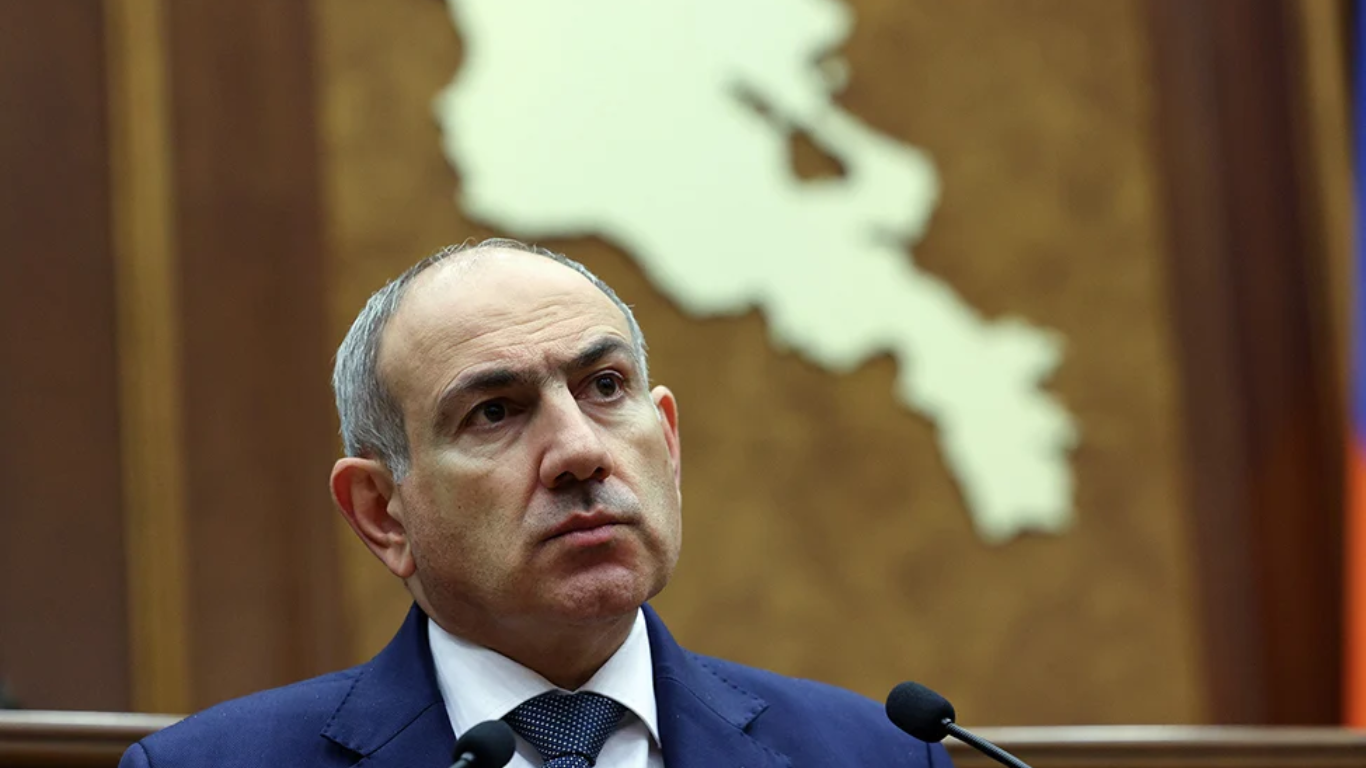Pashinyan’s misleading remarks raise fresh doubts about peace commitment

Armenian Prime Minister delivered an interview with Azerbaijan Public Television in Tirana on May 15, which is quite commendable, considering it is the first time that this has occurred. Though Armenian Prime Minister Nikol Pashinyan once again attempted to present a misleading interpretation in his remarks on the Armenian Constitution, the peace process, and the status of the OSCE Minsk Group. Beneath the rhetoric lies a continued pattern of inconsistency and evasiveness that casts serious doubt on Armenia’s commitment to genuine peace with Azerbaijan.
At the center of Pashinyan’s statements is the claim that Armenia’s Constitution does not contain territorial claims toward Azerbaijan, and that the ratification of a peace agreement would legally override any such concerns. He further asserted that once the Armenian Constitutional Court confirms the compatibility of the peace treaty with Armenia’s laws, there would be no barriers to ratification. However, this argument not only distorts Armenia’s legal hierarchy but also ignores key facts about Yerevan’s historical and ongoing behavior.
Pashinyan's attempt to argue that international treaties automatically supersede domestic laws is legally unconvincing. Article 5 of Armenia’s own Constitution clearly states that the Constitution itself holds the highest legal force. International treaties only prevail if they do not contradict the Constitution—meaning any agreement that acknowledges Azerbaijan’s territorial integrity would still be subject to limitations rooted in Armenia's foundational laws.
Furthermore, Armenia’s coat of arms, which includes Mount Ararat—a symbol tied to "Western Armenia" and other irredentist aspirations—remains enshrined in the Constitution under Article 21. The continued inclusion of these symbols is not a matter of historical nostalgia; it reflects a broader ideological stance that has real implications for peace and stability in the region.
It is also worth recalling the Armenian Constitutional Court’s decision from January 2010, which effectively reaffirmed the validity of Armenia’s territorial claims by declaring the preamble of the Declaration of Independence to be immutable and integral to statehood. A similar position was reaffirmed in the Court's 2024 ruling on border delimitation regulations with Azerbaijan, underscoring the deep-rooted contradictions between Armenia’s constitutional framework and the goal of long-term peace.
Even if Armenia today claims to accept the principles of the Almaty Declaration and the 1991 borders of the former Soviet republics, its actions over the past three decades tell a different story. From its refusal to recognize these borders in practice, to continued support for the illegal regime in Garabagh well into 2023, Yerevan’s behavior has consistently contradicted its declared commitments.
During and even of the 44-Day Patriotic War, it was Armenia—not Azerbaijan—that repeatedly violated ceasefire agreements and targeted civilian populations in Azerbaijani cities far beyond the conflict zone. These violations have not been forgotten, nor have they been honestly acknowledged by Armenian leadership. Such a legacy demands more than vague verbal assurances—it requires concrete, verifiable action, starting with constitutional reform.
Pashinyan’s proposal to dissolve the OSCE Minsk Group only simultaneously with the signing of a peace treaty is a deliberate stalling tactic. While he claims this linkage is necessary to ensure “reciprocal trust,” the truth is that the Minsk Group has long outlived its relevance. It failed to prevent war, failed to resolve conflict, and continues to be used by Armenia as a political shield to delay progress and preserve outdated narratives.
By refusing to formally close the chapter on this ineffective structure, Armenia retains a fallback option—one that could be reactivated should political winds change in Yerevan. It is telling that while Azerbaijan has moved forward with reconstruction, reintegration, and regional diplomacy, Armenia continues to demand preconditions and delay decisive steps.
Pashinyan’s argument that signing a peace treaty alone will resolve constitutional concerns is not only false—it is reckless. A signature on paper cannot neutralize clauses embedded in Armenia’s founding documents. His assertion implies that treaties can be weaponized or discarded based on the political orientation of future governments. But international peace agreements are not mere political gestures; they must be underpinned by durable legal guarantees. Peace requires more than words, Mr. Pashinyan.
He must also recognize that his government is not everlasting, perpetual. The next administration in Armenia may interpret the Constitution differently, especially if territorial claims remain enshrined within it. If these contradictions are not addressed now, when the opportunity for peace exists, they could become flashpoints for future conflict.
The facts speak for themselves: the Armenian government has delayed constitutional reform, avoided clear renunciation of territorial claims, and continues to invoke the defunct Minsk Group as leverage. If Pashinyan is serious about peace, his government must stop relying on ambiguous legal arguments and symbolic gestures. Concrete change—starting with the Constitution—is the only real guarantee of peace.
For Azerbaijan, internal political shifts in Yerevan are irrelevant. What matters is security, territorial integrity, and legal assurances. Until Armenia demonstrates the political will to make irreversible changes, Baku’s concerns will remain not only valid, but essential to the future of the South Caucasus.
Here we are to serve you with news right now. It does not cost much, but worth your attention.
Choose to support open, independent, quality journalism and subscribe on a monthly basis.
By subscribing to our online newspaper, you can have full digital access to all news, analysis, and much more.
You can also follow AzerNEWS on Twitter @AzerNewsAz or Facebook @AzerNewsNewspaper
Thank you!

